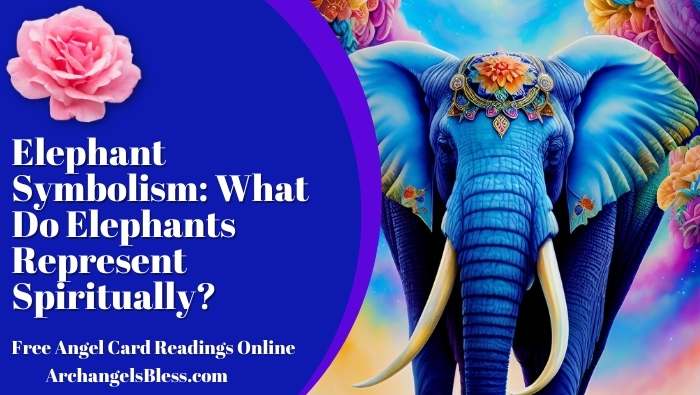Elephant Symbolism: What Do Elephants Represent Spiritually?
Elephants are majestic creatures that have fascinated humans for centuries.
These intelligent animals are impressive in their physical size and strength and hold an important place in different cultures worldwide.
From their appearance in various religious and spiritual traditions to their symbolism in popular culture, elephants represent a range of meanings and ideas.
In this article, we will explore the symbolism of elephants in different cultures and contexts.
The Elephant Animal Totem
The elephant is a powerful and majestic animal revered in many cultures as a symbol of strength, wisdom, and loyalty.
As an animal totem, the elephant represents patience, determination, and family values.
People who feel a strong connection to the elephant totem are often seen as nurturing, protective, and empathetic individuals who prioritize the well-being of their loved ones above everything else.
The elephant totem is also associated with the root chakra, representing stability, grounding, and security, making it an excellent source of strength for those seeking to feel more grounded and secure.
The elephant totem is often believed to bring good luck and fortune to those who align themselves with its energies.
It is said to help individuals overcome obstacles and challenges with grace and perseverance and inspires them to keep moving forward even when the going gets tough.
People who feel connected to the elephant totem often possess an innate sense of intuition and wisdom, enabling them to navigate life’s complexities with ease and confidence.
Overall, the elephant totem is a powerful and uplifting symbol that can bring immense value and meaning to one’s spiritual journey.
The Elephant in Hinduism and Buddhism
In Hinduism, the elephant is revered as a symbol of wisdom, strength, and good luck.
Lord Ganesha, one of the most popular Hindu deities, has an elephant’s head and is considered the remover of obstacles.
According to Hindu mythology, Ganesha was given an elephant head after his original head was cut off by his father, Lord Shiva, and replaced with that of an elephant.
In Buddhism, the elephant represents mental strength, a symbol of determination, and a source of spiritual protection.
Elephants in African Culture
In African culture, elephants symbolize strength, power, and dignity.
The elephant is often featured in African folk tales as a wise and powerful animal that can communicate with humans.
The elephant is also a symbol of fertility, and many African cultures believe that elephants have the power to bring rain.
The Elephant in Western Culture
In popular culture, elephants are often depicted as gentle giants with a heart for helping others.
In the Western world, elephants are a famous symbol of strength, stability, and loyalty.
Elephants are also known for their intelligence and memory, which has led to their use as a symbol of wisdom.
The Elephant as a Spirit Animal
In many spiritual traditions, animals are considered to have spiritual qualities and are believed to act as guides or protectors for individuals.
The elephant is one such animal that is regarded as a spirit animal in many cultures.
Elephants represent strength, wisdom, loyalty, and kindness as spirit animals.
The Efforts to Protect Elephants
As elephants continue to face threats such as poaching and habitat loss, several organizations have been established to protect them.
One of these organizations is the Elephant Sanctuary in Tennessee, which provides a natural habitat for elephants rescued from captivity.
The sanctuary also educates the public about the plight of elephants and the importance of conservation efforts.
Another organization working to protect elephants is the David Sheldrick Wildlife Trust in Kenya.
The trust focuses on rescuing and rehabilitating orphaned elephants and reintroducing them into the wild.
The organization also supports anti-poaching efforts and works to raise awareness about the importance of protecting elephants and their habitats.
Elephants in Art and Literature
Throughout history, elephants have been a popular subject in art and literature.
In ancient Greek and Roman art, elephants were often depicted in battle scenes, while in Asian art, elephants were often associated with royalty and prosperity.
In literature, elephants have been featured in numerous works, from Rudyard Kipling’s “The Jungle Book” to Ernest Hemingway’s “The Short Happy Life of Francis Macomber.”
Elephants in Mythology and Folklore
In addition to their role in religious traditions, elephants have played a significant role in mythology and folklore worldwide.
In Hindu mythology, the elephant-headed deity Ganesha is a beloved figure associated with wisdom and success.
In African folklore, elephants were sometimes believed to have supernatural powers and were feared by humans.
Elephant Conservation Efforts Around the World
As mentioned in the article, elephants face many threats in the wild, including habitat loss and poaching.
However, many organizations and initiatives are working to protect elephants and their habitats worldwide.
From elephant sanctuaries to anti-poaching programs, these efforts are crucial for ensuring the survival of these magnificent animals.
The Elephant’s Role in Ecotourism
Ecotourism is a growing industry that allows travelers to experience wildlife and natural habitats sustainably and responsibly.
Elephants are often a popular attraction for eco-tourists, who can observe these animals in their natural habitats while supporting conservation efforts.
However, ecotourism operators must ensure their practices are ethical and sustainable to avoid harming elephant populations.
The Elephant’s Place in Modern Culture
Elephants remain a famous symbol in modern culture, appearing in everything from clothing and jewelry to movies and television shows.
However, as society becomes more aware of the importance of elephant conservation, there is also a growing movement to use elephant symbolism more responsibly and sustainably.
Conclusion
In conclusion, elephants hold significant meaning and symbolism in different cultures worldwide, from their portrayal as powerful and wise creatures to their use as spirit animals and symbols of protection.
As we continue to learn more about these majestic animals, we must appreciate their importance in our lives and cultures and work to protect them from threats such as poaching and habitat loss.
By supporting organizations such as the Elephant Sanctuary in Tennessee and the David Sheldrick Wildlife Trust in Kenya, we can make a difference in the fight to protect these amazing animals for generations.
FAQs
- What is the elephant animal totem?
The elephant animal totem symbolizes patience, determination, and family values. It represents strength, wisdom, and loyalty. - What is the significance of elephants in Hinduism and Buddhism?
In Hinduism, the elephant symbolizes wisdom, strength, and good luck. In Buddhism, the elephant represents mental strength, determination, and spiritual protection. Lord Ganesha, one of the most popular Hindu deities, has an elephant’s head and is considered the remover of obstacles. - What do elephants represent in African culture?
In African culture, elephants represent strength, power, dignity, and fertility. They are also believed to have the ability to bring rain. - How can individuals align themselves with the elephant totem?
Individuals can align themselves with the elephant totem by seeking stability, grounding, and security. They can also focus on nurturing, protecting, and empathizing with their loved ones and developing their intuition and wisdom. - What organizations are working to protect elephants?
Several organizations, such as the Elephant Sanctuary in Tennessee and the David Sheldrick Wildlife Trust in Kenya, are working to protect elephants by providing natural habitats for them, rehabilitating and reintroducing orphaned elephants into the wild, and supporting anti-poaching efforts. - What is ecotourism, and how does it involve elephants?
Ecotourism is a growing industry that allows travelers to experience wildlife and natural habitats sustainably and responsibly. Elephants are often a popular attraction for eco-tourists, who can observe these animals in their natural habitats while supporting conservation efforts. However, ecotourism operators must ensure their practices are ethical and sustainable to avoid harming elephant populations. - Why is there a growing movement to use elephant symbolism more responsibly and sustainably?
As society becomes more aware of the importance of elephant conservation, there is a growing movement to use elephant symbolism more responsibly and sustainably to avoid promoting harmful practices such as poaching or keeping elephants in captivity.
Elephant Animal Totem Journal Questions
- What does the elephant symbolize to you? How has this symbolism influenced your life?
- Have you ever encountered an elephant in real life? If so, what was the experience like? How did it make you feel?
- In what ways do elephants inspire you? Do you think there are any lessons we can learn from them?
- Have you ever had a dream or vision involving elephants? If so, what do you think it meant?
- How do elephants fit into your spiritual or religious beliefs? Do you think they have any special significance in this regard?
- What does it mean to have an elephant as your totem animal? How can you connect with this energy in your daily life?
- Have you ever used an elephant figurine or image in meditation or spiritual practice? If so, what was the experience like?
- What are some qualities that you admire in elephants? How can you cultivate these qualities in yourself?
- How do you feel about the conservation of elephants and their natural habitats? What actions can you take to support this cause?
- In what ways do you think elephants are misunderstood or misrepresented in popular culture? How can we work to change this narrative?
You may also enjoy…
Receive FREE Angel Card Readings [Anytime Day or Night]
The Healing Powers of Disney World: Real or Just Magic?
The Spiritual Meaning of Lightning Strike at Marley’s One Love Concert
May you remember how Divine you truly are!
In Love & Grace,

Here Are The Benefits Fellow A Bundle of Healing Love Angel Session Members Report Back Experiencing…
✅Feeling empowered to take steps towards your soul’s calling and life purpose
✅Deeper communication and guidance from the Angels
✅Recognizing unlimited possibilities and potential for personal growth and fulfillment
✅Trusting in Divine guidance and assistance from the Archangels and higher beings of light
✅Having faith in the process of life and it’s unfolding
✅Believing in their capacity to rise above obstacles with grace and ease
✅Embracing the power of miracles and unlimited possibilities
✅Feeling more content, focused, loved, and connected
✅Improved vitality and well-being
✅Enhanced spiritual gifts abilities unfolding




0 Comments